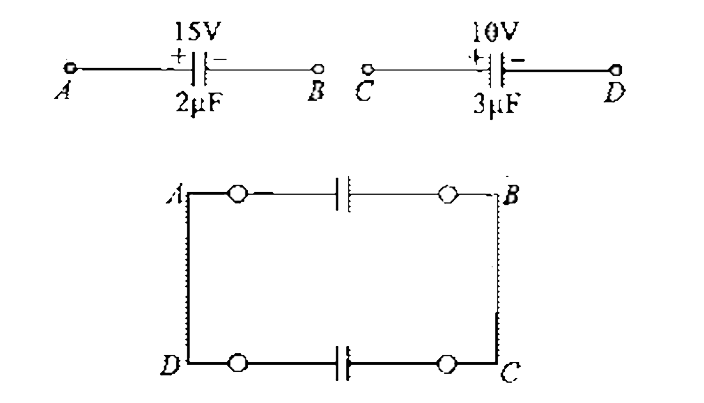When two identical capacitors are charged individually to different potentials & then connected in parallel, after disconnecting from the source then
net charge = sum of initial charges
net potential difference sum of individual initial potential difference
net energy stored sum of individual initial energy
all of these
The correct Answer is:D
As source is disconnected hence Q = , after disconnecting from the source they are connected in parallel, hence net potential difference , when charged capacitor at different potentials are connected together their always occurs a loss of energy in the form of heat.
Topper's Solved these Questions
Similar Questions
Two identical capacitors are charged to different potentials φ1andφ2 relative to the negative earthed electrodes. The capacitors are then connected in parallel (Fig. 24.21). Find the potential of the battery after the connection was made and the change in the energy of the system.
View SolutionN identical capacitors are connected in parallel which are charged to a potential V. If these are separated and connected in series then what potential difference will be obtained?
View Solution
Knowledge Check
Initially two capacitors are charged to different potential differences as shown in figure and then connected in parallel as shown. Which of the following is incorrect about this circuit?
 AFinal charge on each capacitor will be zeroBFinal total electrical energy of the capacitors will be zeroCTotal change from A to D is 30μCDTotal charge flown from A to D is −30μC
AFinal charge on each capacitor will be zeroBFinal total electrical energy of the capacitors will be zeroCTotal change from A to D is 30μCDTotal charge flown from A to D is −30μCn identical capacitors are connected in parallel to a potential difference V. These capacitors are then reconnected in sereis, their charges being left undisturbed. The potential difference obtained is
AzeroB(n−1)VCnVDn2VSix identical capacitors are joined in parallel, charged to a potential difference of 10 V, separated and then connected in series. Then the potential difference between the free plates is
A10 VB30 VC60 VD(106)V
A parallel plate capacitor is charged to a potential difference V by a dc source. The capacitor is then disconnected from the source. If the distance between the plates in doubled, state with reason how the following will change,
(i) electric field between the plates,
(ii) capacitance and
(iii) energy stored in the capacitor.
View SolutionThe space between the rectangular plates (with sides aandb) of a parallel-plato capacitor (the distance between the plates is l) is filled with a solid dielectric whose dielectric constant is c. The capacitor is charged to a certain potential difference and disconnected from the voltage source. After that the dielectric is slowly moved out of the capacitor, which lTIOanS that the section x not filled with the dielectric gradually increases in size. How wi ll the potential difference between the plates and the surface charge densities on both parts of the capacitor (with and without the dielectric) change in the process?
View SolutionTwo identical air capacitors are connected in series. How will the charge on and potential difference across each capacitor change when the distance between the plates of one capacitor is increased in the following cases: when the capacitors are connected to a DC source, and when the capacitors are first charged and then disconnected from the DC source?
View SolutionThe enrgy of a charged capacitor is U. Another identical capacitor is connected parallel to the first capacitor, after disconnecting the battery. The total energy of the system of these capacitors will be
View SolutionIt is possible to obtain a large potential difference by charging a number of capacitors in parallel and then disconnecting them to connect them again in series. What maximum potetnial difference can be obtained using 10 capacitors each of 5μF and a charging source of 400V ?
View Solution
